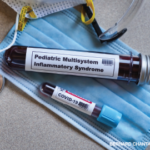Unique Role of Rheumatologists

Dr. Gaylis
As a rheumatologist practicing in South Florida, Norman Gaylis, MD, has been seeing patients with persistent symptoms of COVID-19 at Arthritis & Rheumatic Disease Specialties, Aventura, Fla., for over nine months—beginning well before wide recognition these patients existed.
He notes that early in the pandemic the clinic was proactive in testing patients to ensure they didn’t have COVID-19 prior to their clinical visits during which they were to receive biologic infusions. He and his colleagues noticed their patients were getting COVID-19 less than the population at large, as reported in a study presented at the ACR Convergence 2020.9
“Then, suddenly, we started seeing more patients,” he says, referring to patients coming after COVID-19 infection with persistent symptoms. “Suddenly, 30% of my new patient population are those related to COVID-19.”
Dr. Gaylis notes many of these patients are coming in with joint pain, muscle pain, fatigue, rashes and neuropathy—symptoms suggestive of an autoimmune disease. He thinks a big reason he’s seeing more of these patients—and why he thinks this may be true of more rheumatologists—is the experience rheumatologists have with biologic drugs, which he says can be used to dampen the symptoms experienced by long-haulers.
‘We need to come to terms with the fact that there are many people who have long-term medical conditions because of COVID-19,’ says Swati Deshmukh, MD.
“The familiarity we have with treating autoimmune diseases due to cytokine antibodies is what makes us the ideal specialists for patients coming in with a multiplicity of symptoms and manifestations,” he says. Rheumatologists, he adds, are used to figuring out what treatments to try for symptoms without a clear diagnosis based on a good understanding of disease and sometimes with the availability of information from laboratory tests showing immunologic abnormalities.
Dr. Gaylis compares treating the long-haulers he sees with treating patients with lupus or vasculitis. “There is no one way to treat these patients [because] any organ system can be involved, ranging from the gastrointestinal tract to cardiovascular system, to musculoskeletal or skin,” he says. “What you’re looking at is a jigsaw puzzle.”
Table 1: Most Common Persistent Post-COVID Symptoms
| Symptom (% of patients) | Description |
|---|---|
| Fatigue (58%) | Resemble symptoms seen in CFS patients, including severe incapacitating fatigue, pain, neurocognitive disability, compromised sleep, worsening symptoms with physical or mental exertion. |
| Neuropsychiatric symptoms; headache (44%), attention disorder (27%), anosmia (21%) | Brain fog and neuropathy also reported; anxiety disorders, insomnia and dementia are the most common psychiatric conditions that present post COVID-19. Adults are at double the risk of developing a newly diagnosed psychiatric disorder after COVID-19 diagnosis. |
| Dyspnea (24%) and cough (19%) | Abnormalities in CT lung scans persisted in 35% of patients up to 60–100 days after COVID-19. |
CFS, chronic fatigue syndrome; CT, computed tomography
Example: When he sees a long-hauler patient with joint pain, Dr. Gaylis assumes the pain is driven by one of the inflammatory cytokines that causes joint pain in his normal patient population. Therefore, he measures the patient’s cytokine levels and, if the tumor necrosis factor (TNF) alpha or interleukin (IL) 6 levels are high, he’ll suggest using a drug that blocks that cytokine.
“And that is pretty much how we’ve treated these patients,” he says.
Currently, Dr. Gaylis is recruiting patients to enroll in a U.S. Food & Drug Administration exploratory study to evaluate the safety and efficacy of a monoclonal antibody, leronlimab (NCT04347239). The drug blocks the C-C chemokine receptor type 5 (CCR5), a receptor responsible for immune and inflammatory responses.10
Data on response to blocking this receptor, says Dr. Gaylis, may shed light on other autoimmune diseases, such as chronic fatigue syndrome and fibromyalgia, that have long baffled rheumatologists and others.
“This may be a silver lining to COVID-19, if we can discover new treatments for diseases we’ve had a tough time treating,” he says.



